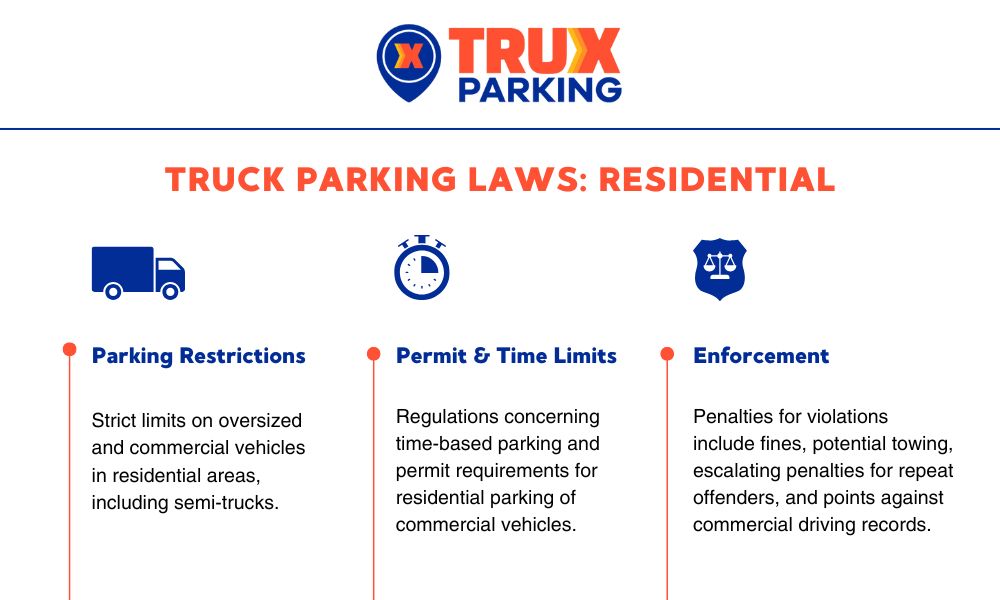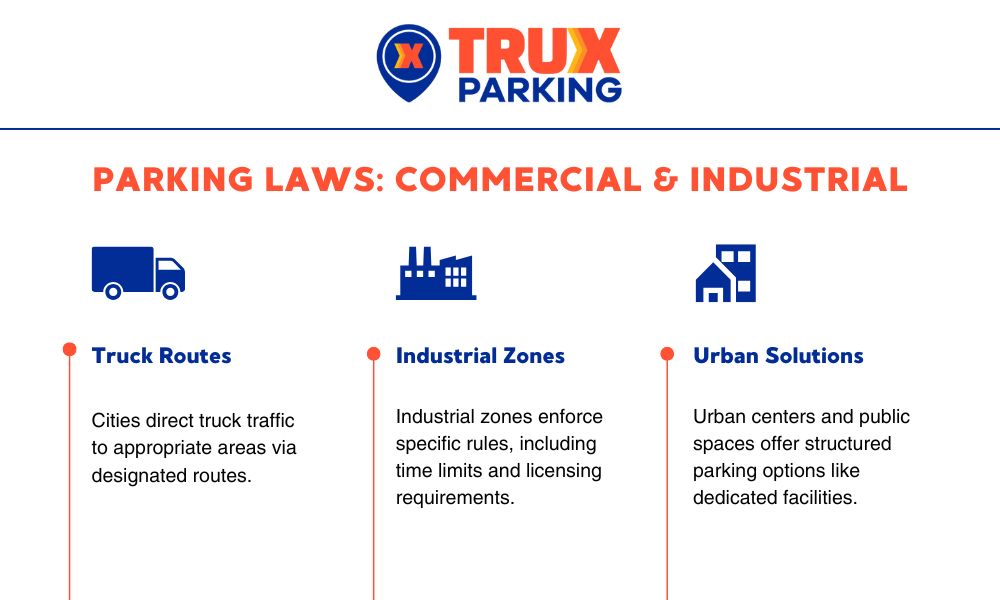Table of Contents:
The Short Answer: Semi-truck parking laws are local, state, and federal regulations that restrict where and when commercial vehicles can park. These laws typically prohibit semi trucks from parking on residential streets, limit time in public parking areas, and establish designated zones for commercial vehicle parking. Rules vary widely by location, so truck drivers must check local regulations for each area they travel through.
Federal, State, & Local Laws
At the federal level, most regulations focus on addressing the shortage of viable commercial truck parking. State laws typically address truck routes, weight restrictions, and rest area parking along highways. Many states have conducted statewide truck parking studies to understand industry needs better.
The most restrictive rules come from city and county ordinances. Local authorities frequently prohibit truck tractors and trailers from parking in residential areas. Municipal codes may restrict commercial vehicles over certain dimensions from parking on public streets, especially overnight. Many cities require a parking permit for commercial vehicles within city limits.
Why These Laws Exist & The Impact on Truck Drivers
These laws exist primarily to balance public safety and community concerns with the needs of the trucking industry. For truck drivers, especially owner-operator drivers, these varying regulations create daily challenges. A legal parking space in one jurisdiction might result in a parking ticket just a few miles away.
Commercial vehicle operators must understand key terms in parking regulations, such as oversized vehicle definitions and motor vehicle restrictions that include separate rules for vehicles with attached trailers. Navigating these complex rules is essential not just for avoiding fines but also for planning efficient routes and rest periods.
Residential Area Parking Regulations
Parking a semi-truck in residential areas is one of the most challenging aspects of truck parking laws. Many truck drivers want to park near their homes, but residential street parking for commercial vehicles is heavily regulated.

Common Residential Restrictions
Most residential areas have strict rules against parking oversized vehicles on neighborhood streets. These restrictions typically apply to:
- Semi-trucks with or without trailers
- Commercial vehicles over specific lengths (often 20-25 feet)
- Vehicles exceeding certain heights (usually 7-9 feet)
- Any vehicle with a gross weight rating above 10,000 pounds
- Recreational vehicles and boat trailers (which often fall under similar regulations)
Time-Based Restrictions
Even in areas where semi-truck parking isn’t completely banned, time limits often apply. Local ordinances frequently include:
- No overnight parking of commercial vehicles
- Limited loading/unloading periods (typically 30-60 minutes)
- Restricted hours (commonly prohibiting parking between 10 PM and 6 AM)
- Requirements to move vehicles every 24-72 hours
Permit Requirements
Some residential areas offer parking permit options for commercial vehicle operators who need to park in their neighborhoods. These permits:
- Often require proof of residence in the immediate area
- May have higher fees than standard residential parking permits
- This can include restrictions on the specific location or position of the vehicle
- Typically need regular renewal (monthly, quarterly, or annually)
Enforcement and Penalties
Violations of residential parking rules can result in significant consequences. Breaking residential area parking restrictions can be costly. Penalties often include:
- Parking tickets with fines ranging from $35 to $150 (first time)
- Potential vehicle towing and impound fees
- Escalating penalties for repeat offenders
- In some jurisdictions, points against commercial driving records
Alternatives for Truck Drivers
When residential street parking isn’t an option, truck drivers living in these areas need alternatives. Some cities provide:
- Designated commercial vehicle parking areas near residential zones
- Special overflow parking lots for oversized vehicles with resident permits
- Limited exceptions for drivers with proper documentation of hardship
- Zoning variances in certain cases where no reasonable alternatives exist
For semi-truck drivers who own their homes, private property parking may be an option, but even this comes with limitations. Many homeowner associations and city codes restrict parking commercial vehicles in driveways or on private property visible from the street. Some truck drivers have successfully petitioned for variances to these rules, but the process varies by location and often requires approval from the city council or zoning board.
Commercial and Industrial Zone Parking
While residential areas often prohibit semi-truck parking, commercial and industrial zones typically offer more options for truck drivers. Understanding these regulations helps drivers find legal parking spaces when on the road.

Designated Truck Routes
Most cities establish specific truck routes to direct commercial vehicle traffic toward appropriate parking areas. These routes connect major highways to industrial zones and are designed to accommodate truck tractors with trailers. Look for signage indicating where truck parking is permitted or prohibited.
Industrial Zone Parking Rules
Industrial areas generally have more favorable rules for commercial vehicles, but restrictions still apply. Time limits may be enforced, even in industrial zones. Some areas require business licenses for overnight parking while loading zones typically permit parking only during active loading/unloading operations.
Public Parking Options
Truck drivers often rely on public parking options when private facilities aren’t available. The most common options include:
- Rest areas along highways (often with time limits)
- Truck stops (which may charge fees for extended parking)
- Designated oversized vehicle parking lots in commercial districts
- Some retail establishments (policies vary by location)
Parking Meters and Loading Zones
Standard parking meters rarely accommodate the length of a semi-truck though many cities have specific oversized vehicle parking areas with specialized meters. Loading zones serve as temporary parking spaces for commercial vehicles but are typically limited to 30 minutes for active loading/unloading and cannot be used for rest periods.
Urban Area Solutions
Urban commercial districts present unique challenges for semi trucks. Many cities have developed solutions including dedicated truck parking facilities at the edges of urban centers and lots where trailers can be dropped while tractors make deliveries. Some have implemented real-time parking availability systems that direct drivers to open spaces.
When navigating commercial zones, always watch for truck restrictions, especially on routes with bicycle lanes or other specialized traffic features. Commercial vehicle operators should check city websites or use trucking apps to identify approved parking areas before entering unfamiliar urban areas.
State-by-State Differences in Truck Parking Laws
While local regulations create the most immediate challenges for truck drivers, state laws also significantly impact semi-truck parking options. These regulations vary widely across the country, creating a patchwork of rules that drivers must navigate.
Regional Variations
Eastern states generally have more restrictive parking laws due to higher population density and limited space. Western states often provide more options, particularly along major interstate corridors. Southern states frequently have fewer restrictions in rural areas but stricter rules in tourist destinations.
Key State Differences
Some states have implemented innovative approaches to truck parking. Michigan has developed public-private partnerships to expand parking capacity, while California enforces strict idling regulations that affect where and how trucks can park. Florida prohibits overnight parking at many rest areas, while Texas allows extended stays at designated locations.
Jason’s Law Impact
Following the passage of Jason’s Law in 2012, the Federal Highway Administration conducted a comprehensive statewide truck parking study. This research revealed significant parking shortages in the Northeast, Pacific Northwest, and California. As a result, many states have begun addressing the issue by converting vacant properties to truck parking and expanding rest area capacity.
Resources for Drivers
Truck drivers must research regulations for each state they travel through. Useful resources include:
- State Department of Transportation websites
- Local enforcement agency pages
- Truck driver apps that compile regulations and identify legal parking areas
- Industry associations that track regulatory changes
Crossing State Lines
When crossing state lines, truck drivers often face conflicting regulations. A license plate that’s permitted to park in one state might face restrictions in another. The most significant differences typically involve:
- Maximum allowed parking duration
- Permit requirements for oversized vehicles
- Idling restrictions that affect where trucks can park
- Special regulations for vehicles carrying certain cargo types
Understanding these state-by-state variations helps truck drivers plan routes with appropriate parking options. Many experienced drivers build databases of reliable parking locations and share this additional information through online forums and industry networks.
How TRUX Parking Solves Truck Parking Challenges
With truck parking laws creating significant challenges for drivers, TRUX Parking offers a comprehensive solution. Our nationwide network of high-quality truck parking lots provides owner-operator drivers with reliable, legal parking options in major industrial hubs.
TRUX lots feature security cameras, high fences, and industrial lighting to protect your valuable equipment. Our facilities eliminate the stress of searching for legal parking spaces or worrying about overnight security.
With 24/7 gate access, TRUX ensures you can park and retrieve your vehicle according to your schedule, not parking regulations. Our online payment system simplifies the process, eliminating the need for parking permits or feeding parking meters.
TRUX is rapidly expanding, with plans to establish lots in every major industrial hub across the country. Soon, members will enjoy the benefits of consistent, secure truck parking along any route they travel.
Find TRUX Parking locations in these states:


